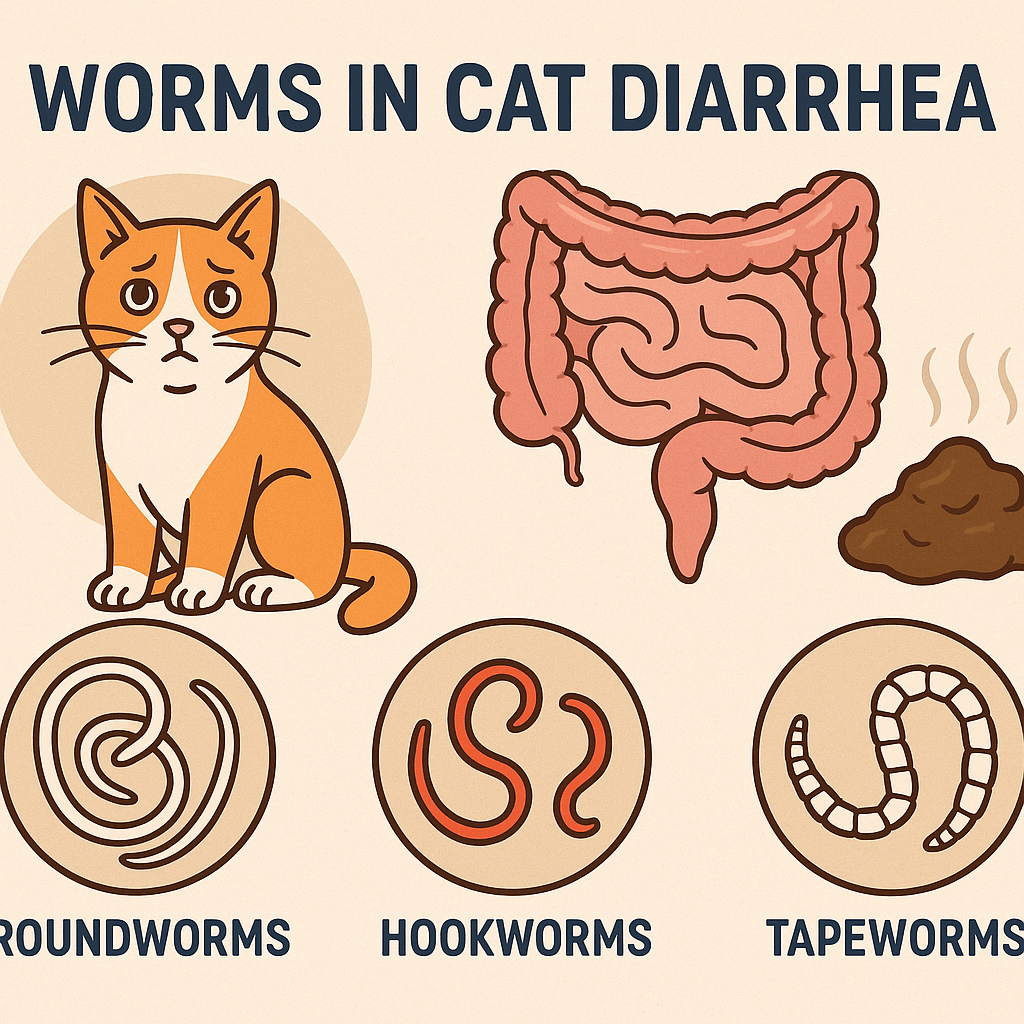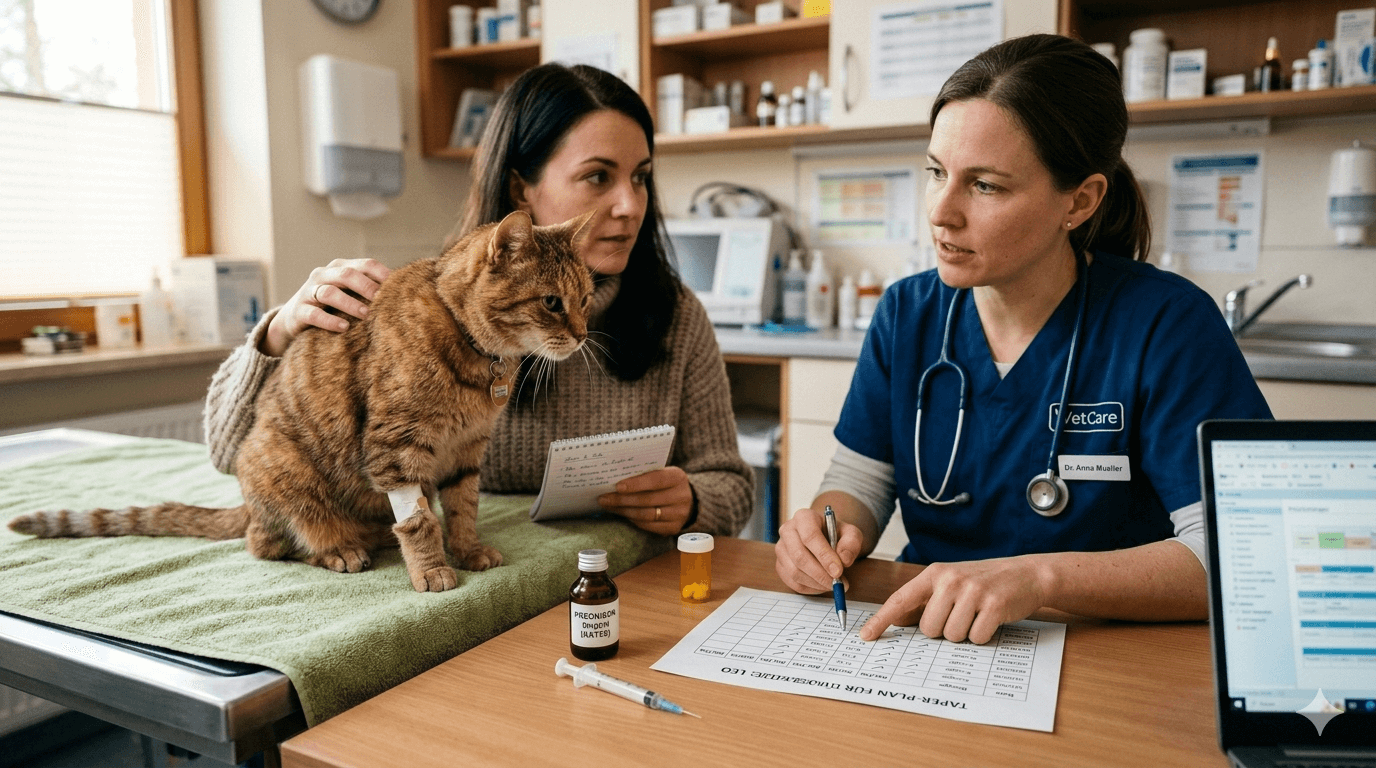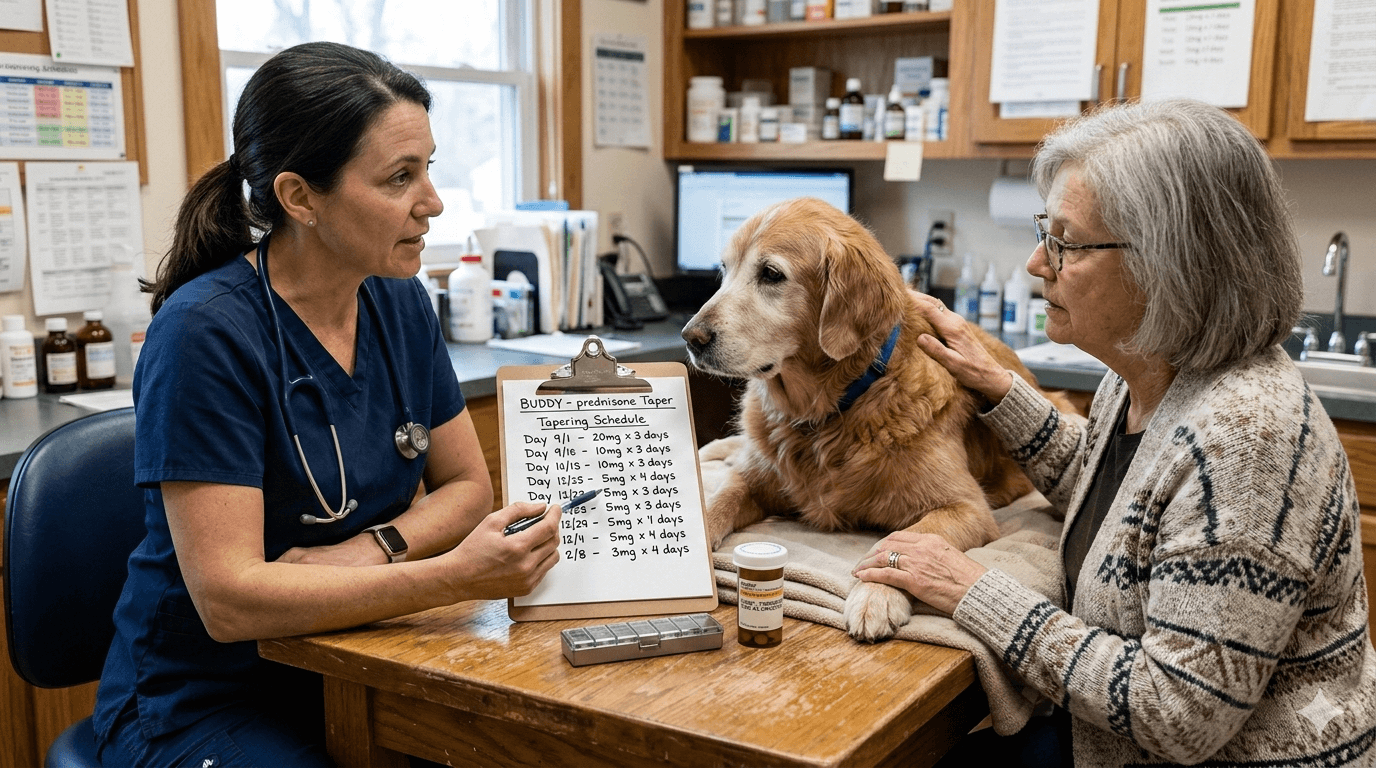Worms in Cat Diarrhea: What You Need to Know
As a cat owner, noticing worms in your cat’s diarrhea can be alarming and distressing. While it’s not uncommon for cats to experience gastrointestinal issues, the presence of worms alongside diarrhea is often a sign of an underlying parasitic infection. These infections can affect your cat’s health, comfort, and overall well-being if left untreated. Understanding the causes, symptoms, and treatment options is essential for protecting your feline friend. In this blog post, we’ll explore everything you need to know about worms in cat diarrhea, from identifying the problem to ensuring your cat stays healthy and parasite-free.
Common Types of Worms Found in Cats
Several types of intestinal parasites can cause diarrhea and other digestive issues in cats. Identifying the specific worm involved is crucial for effective treatment. Here are the most common culprits:
Roundworms:
Roundworms are one of the most prevalent parasites in cats. They look like spaghetti strands and can cause diarrhea, vomiting, and a pot-bellied appearance.Tapeworms:
Tapeworms are flat, segmented parasites that often resemble grains of rice in your cat’s feces or around their anus. Flea infestations are a common cause of tapeworms.Hookworms:
Hookworms attach to the intestinal lining and feed on blood, leading to bloody diarrhea, anemia, and weight loss in severe cases.Whipworms:
Whipworms are less common but can still cause chronic diarrhea and inflammation in the intestines.Giardia (Protozoan Parasite):
Though not technically a worm, Giardia is another parasite that can cause watery diarrhea and dehydration in cats.
Recognizing these parasites helps you take swift action to address the issue and restore your cat’s health.

Signs Your Cat May Have Worms
Detecting worms early can prevent complications and ensure timely treatment. Look out for these common signs that may indicate a parasitic infection.
Visible Worms in Feces or Vomit:
The most obvious sign is seeing worms in your cat’s stool or vomit. This is a clear indication of an infestation.Diarrhea with Mucus or Blood:
Diarrhea accompanied by mucus or blood is a red flag for parasitic infections, especially hookworms or whipworms.Weight Loss and Poor Coat Condition:
A sudden drop in weight or a dull, unkempt coat may suggest internal parasites draining your cat’s nutrients.Lethargy and Weakness:
Infected cats often appear tired, weak, or less active than usual due to nutrient depletion and discomfort.Excessive Licking or Scooting:
Cats with anal irritation caused by worms may scoot their bottoms on the floor or lick excessively around the area.
If you notice any of these symptoms, it’s important to consult your veterinarian promptly for diagnosis and treatment.
Check this guide 👉Should a Cat Poop Every Day? Best 7 Expert Tips!
Check this guide 👉Can Dogs Get Worms from Eating Cat Poop? Best 7 Tips!
Check this guide 👉Can You Flush Cat Poop? Best 7 Expert Tips!
Symptoms of Worm Infections | Possible Causes of Worm Infestations |
|---|---|
Visible worms in feces or vomit | Ingesting contaminated soil or prey |
Diarrhea with mucus or blood | Contact with infected fleas |
Weight loss and poor coat condition | Nursing kittens exposed to mother’s milk |
Lethargy and weakness | Poor hygiene or grooming habits |
Excessive licking or scooting | Exposure to contaminated water sources |
How to Treat Worms in Cats
Treating worms in cats requires veterinary guidance and appropriate medication. Here are some steps to follow when addressing this issue.
Visit the Veterinarian:
Schedule an appointment with your vet to confirm the type of worm and receive a tailored treatment plan.Administer Deworming Medication:
Most deworming medications come in oral or topical forms and target specific parasites. Follow the dosage instructions carefully.Address Secondary Symptoms:
If your cat has diarrhea, provide bland food and plenty of water to prevent dehydration. Probiotics may also help restore gut health.Treat Flea Infestations:
Since fleas can carry tapeworm eggs, treating your cat and home for fleas is essential to prevent reinfection.Clean the Environment:
Wash bedding, vacuum carpets, and disinfect surfaces to eliminate any lingering parasite eggs or larvae.
With proper treatment and care, your cat can recover quickly and return to their playful self.
Preventing Worm Infestations in Cats
Prevention is always better than cure when it comes to parasitic infections. These tips can help keep your cat worm-free and healthy.
Regular Deworming Treatments:
Administer routine deworming treatments as recommended by your vet, especially for outdoor or hunting cats.Flea Prevention Measures:
Use flea collars, spot-on treatments, or oral medications to protect your cat from fleas, which can transmit tapeworms.Monitor Hunting Behavior:
If your cat hunts rodents or birds, supervise them closely since prey animals can carry parasites.Maintain Good Hygiene:
Clean litter boxes daily and wash your hands after handling your cat’s feces to reduce the risk of contamination.Avoid Contaminated Areas:
Keep your cat away from areas where other animals defecate, such as sandboxes or communal gardens.
By implementing these preventive measures, you can significantly reduce the risk of worm infestations in your cat.
Additional Tips for Managing Diarrhea in Cats
While worms are a common cause of diarrhea, there are other ways to manage and alleviate your cat’s discomfort during recovery.
Provide Hydration:
Encourage your cat to drink water to combat dehydration caused by diarrhea. Offer fresh water frequently.Offer Bland Foods:
Feed easily digestible foods like boiled chicken or pumpkin puree to soothe your cat’s upset stomach.Limit Stressful Situations:
Minimize changes in your cat’s environment, as stress can exacerbate digestive issues.Monitor Eating Habits:
Watch how much and what your cat eats to identify potential triggers for diarrhea.Consult Your Vet for Persistent Issues:
If diarrhea persists despite treatment, seek further advice to rule out other underlying conditions.
These strategies can complement worm treatment and promote faster recovery.
Common Misconceptions About Worms in Cats
Misunderstandings about worms can lead to improper care or delayed treatment. Clearing up these misconceptions ensures better outcomes for your cat.
Myth: Indoor Cats Don’t Get Worms:
Even indoor cats can contract worms through fleas or contaminated food.Myth: Deworming Once Is Enough:
Regular deworming is necessary, as cats can become reinfected over time.Myth: All Worms Are Visible:
Some worms, like hookworms, may not be visible in feces but still cause harm.Myth: Over-the-Counter Treatments Always Work:
Not all medications target every type of worm; vet-prescribed treatments are more effective.Myth: Worms Only Affect Kittens:
Adult cats are equally susceptible to worm infestations, especially those with outdoor access.
Understanding these facts helps you make informed decisions about your cat’s health.
How to Choose the Right Deworming Medication
Selecting the correct deworming treatment depends on several factors. Here’s how to ensure you choose wisely.
Identify the Specific Worm Type:
Different medications target specific worms, so knowing the culprit is critical for effective treatment.Follow Veterinary Recommendations:
Your vet will prescribe the safest and most effective product based on your cat’s age, weight, and health status.Check for Side Effects:
Some medications may cause mild side effects like vomiting or lethargy; discuss these risks with your vet beforehand.Consider Combination Treatments:
Some products address multiple parasites simultaneously, offering broader protection for your cat.Stick to the Prescribed Schedule:
Complete the full course of treatment, even if symptoms improve, to prevent reinfection or resistance.
Choosing the right medication ensures your cat receives the best possible care for their condition.
Frequently Asked Questions About Worms in Cat Diarrhea
Can humans get worms from cats?
Yes, certain worms like roundworms and hookworms can be transmitted to humans, so practicing good hygiene is essential.
How long does it take to treat worms in cats?
Treatment typically lasts 1-2 weeks, depending on the type of worm and severity of the infestation.
Is diarrhea always caused by worms?
No, diarrhea can result from various factors, including dietary changes, stress, or viral infections.
Can indoor cats get worms?
Yes, indoor cats can still get worms through fleas, contaminated food, or exposure to other pets.
What should I do if my cat has bloody diarrhea?
Seek immediate veterinary care, as bloody diarrhea can indicate a serious condition requiring prompt treatment.
Staying Vigilant Against Worm Infestations
Worms in cat diarrhea are more than just an inconvenience—they’re a sign that your cat needs attention and care. By staying informed about the types of worms, recognizing symptoms early, and following preventive measures, you can safeguard your feline companion’s health. Remember, regular veterinary check-ups and proactive care are key to keeping your cat happy, healthy, and parasite-free. With a little effort and vigilance, you can ensure your furry friend enjoys a long and comfortable life by your side.
How to Taper Off Prednisone for Cats: Best 7 Expert Tips! – Safely reduce prednisone with vet guidance. Learn now!
How to Taper Off Prednisone Schedule for Dogs: Best 7 Tips! – Learn the safe way to reduce prednisone, recognize withdrawal signs, and keep your dog healthy during the process.
Can a Cat Scratch Give You Rabies? Best 7 Expert Tips! – Learn how rabies spreads, assess risks from cat scratches, and know when to seek medical help. Stay safe!
Can a Dog Scratch Give You Rabies? Best 7 Expert Tips! – Learn the risks, symptoms, and steps to take if scratched by a dog. Stay informed and protect yourself from rabies exposure.




